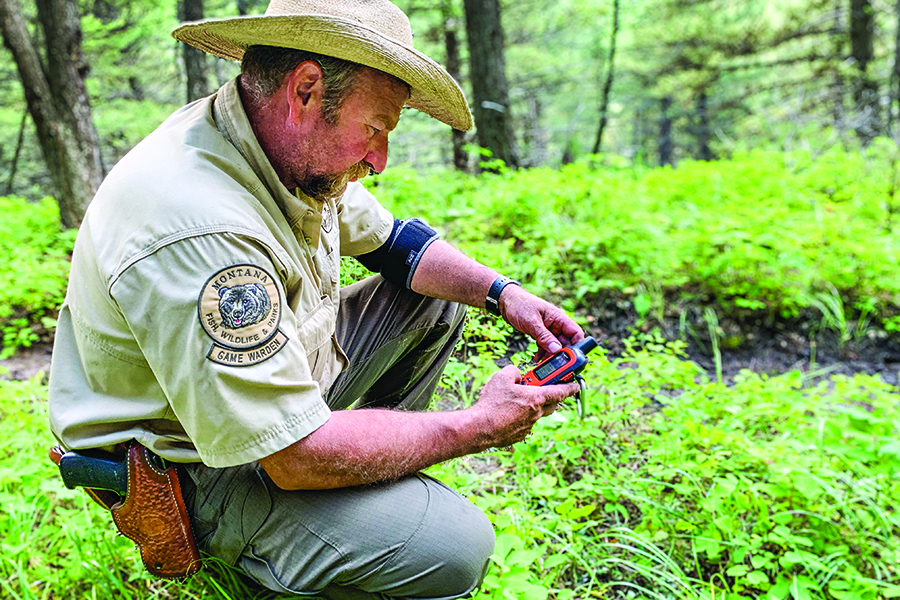Warden of the Woods
Game warden Perry Brown retires after more than three decades patrolling wild places, including the Bob Marshall Wilderness Area
By Tristan Scott
Perry Brown doesn’t cut the typical profile of a career law enforcement officer, and yet he’s hanging up his badge after more than three decades on the job.
He’s more at ease on horseback than riding in a patrol car, more comfortable stringing up a pack of mules than writing a ticket. He has to be, given that his jurisdiction includes more than 1 million acres of rugged Montana wilderness, where he’s more likely to encounter a grizzly bear than a fleeing suspect, or even a poacher quartering an out-of-season elk.
Still, after 32 years policing some of the state’s most cherished natural resources while keeping hunters and anglers honest in their pursuits, he’s capping off his career as a cop who’s enforced the laws of the land.
Based in Columbia Falls, Brown has been a game warden with Montana Fish, Wildlife and Parks (FWP) since 1988, working for the past 25 years to cultivate relationships across a sprawling chunk of country spanning the Flathead River to the Continental Divide, and from Glacier National Park south around Hungry Horse Reservoir to the Bob Marshall and Great Bear wildernesses. It’s a lot of territory for one man, and his success is due as much to the professional and personal respect he’s earned as it is to the rarefied backcountry skillset he’s honed.
Among hunters, anglers and other neighboring agency officials with whom he regularly collaborates, Brown is held in high esteem, even if his presence on the landscape instills fear in those who are out to “cheat the system.”
“The law enforcement end of being a game warden is just a small part of what I do,” Brown said. “The key to preserving and conserving the fish and wildlife resource is about making connections. I work with Glacier National Park personnel, U.S. Forest Service personnel, outfitters, hunters and fishers. The sportsmen are my eyes and ears, and the majority of them are trying to do the right thing. There’s a few who are trying to cheat the system, and that’s what I’m trying to stop. But even in my district, covering millions of acres, I never feel like I’m by myself. I’ve always had the sense that the majority of the people out there are trying to do what’s right.”
Born in Kalispell and raised in Libby, Brown hung up his badge at the end of December but says he’ll continue to keep a watchful eye over public lands and the natural resources he’s been sworn to protect his entire adult life.
Brown was a warden trainee in Bozeman in 1983 straight out of college. After a couple of years, he transferred to Chinook where he became the district game warden. In 1993, Brown had the opportunity to return home and he took it, transferring again to the Flathead Valley to work in Columbia Falls.
Poaching and trespassing are two of the biggest infractions Brown encounters during hunting season, and a major resource has been the 1-800-TIP-MONT phone line, which allows callers to place tips anonymously. The popularity of the hotline is testament to Brown’s belief that a strong conservation ethic runs through the state’s sportsmen and women, and his job is to keep that current charged through education and enforcement.
In 1996, Brown earned the state’s top honor for game wardens, the Shikar-Safari Club International’s Wildlife Officer of the Year for Montana. The award cited, among other important attributes, Brown’s backcountry enforcement skills, his rapport with sportsmen, his extensive involvement with the local hunter’s education courses and his efforts to protect native bull trout as key reasons for honoring him.
Brown has worked as a firearms and hand-to-hand combat instructor, has been active in hunter education and is also certified in flying planes and helicopters, a personal interest that benefited him professionally, particularly as his jurisdiction grew in remote country. A warden can ride horseback all day to check on a reported hunting camp, only to find nothing there. In an airplane, Brown could cover hundreds of square miles to gain a sense of the density of hunters and anglers in an area, and then set up to meet them for an inspection as they emerge from the mountains.
“I always wanted to fly, and working in the wilderness I realized pretty early on that I could save a lot of time flying over a drainage versus spending hours and hours riding up a trail and finding nobody up there,” Brown said.
After receiving all his ratings and becoming a flight instructor, he’s now certified to administer pilot tests, and plans to incorporate flying into the next chapter of his career.
“I may come back to FWP to work in some capacity,” he said. “I love this agency.”
Lee Anderson, the warden captain for FWP’s Region 1, said finding someone of Brown’s caliber to replace him won’t be easy.
“There is so much unknown when you step into a warden district like the one Perry covers, which encompasses the Bob Marshall Wilderness. You’re stuck in time back there,” Anderson said. “Even with today’s technology, you don’t have all the modern conveniences. But he’s got the skills. He can start on one end of the Bob and run a pack string for 10 days clear through to the other end. It’s a big district and he’s back there, making contacts, riding through rain and snow. That alone is a big enforcement deterrent. Perry’s got a unique skill set. He honed it over 32 years and that will be tough to replace.”